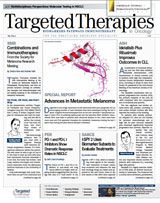DOHH-Inhibiting Drugs Reduce Proliferation of Cervical Cancer Cells
Two drugs that inhibit deoxyhypusine hydoxylase (DOHH) may show promise as potential treatments for cervical cancer, according to research from scientists at Rutgers New Jersey Medical School.
Cytological specimen showing cervical cancer specifically squamous cell carcinoma in the cervix. Tissue is stained with pap stain and magnified x200.
SOURCE: The Web site of the National Cancer Institute (http://www.cancer.gov).
Just in time for Cervical Awareness Month, January 2014, two drugs that inhibit deoxyhypusine hydoxylase (DOHH) may show promise as potential treatments for cervical cancer, according to research from scientists at Rutgers New Jersey Medical School. The DOHH enzyme is believed to be essential to the molecular chain of events that leads to cervical cancer.
Researchers performed lab experiments on cells derived from a cervical cancer and found that when DOHH is blocked, a protein known as eIF5A fails to mature. That, in turn, alters the expression of genes that without the medications, ciclopirox (an antifungal) and deferiprone (a blood treatment), would cause cancer cells to proliferate.
“Some gene products go down and others go up, because mature eIF5A has more than one biochemical action inside cells,” said Michael Mathews, PhD, senior member of the research team in a press release. “For cell proliferation, each drug’s dual action is like both easing off the accelerator and depressing the brake pedal.”
For Mathews and his colleague Hartmut Hanauske-Abel, this is the second success involving these two medications. In September, a research team they led published similar findings in the journalPLoS ONEabout HIVevidence that the same two drugs eradicated the virus from infected cells examined in lab cultures.
Both of these medications are approved by the Food and Drug Administration for indications other than HIV and cervical cancer, which may create a potential shortcut to approval for these new indications, if the drugs prove their worth.
